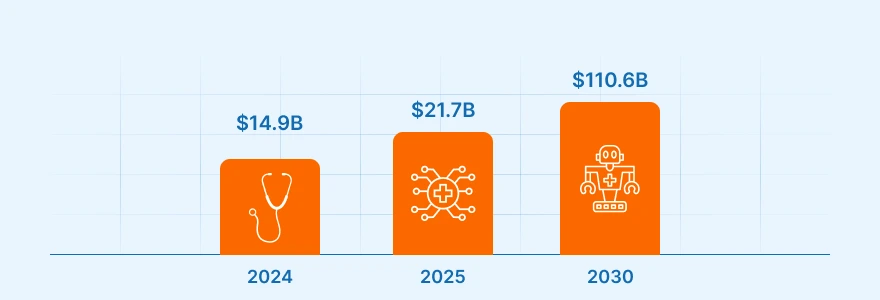
How AI-Powered Applications Are Redefining Healthcare in 2025
Introduction
In 2025, artificial intelligence is helping healthcare providers improve the way they work. Doctors and nurses are using AI tools to find health issues earlier, choose better treatment options, and stay organized with patient records. As a result, patients get treated faster and have a better experience.
These tools are also helping with things like online check-ups, reviewing scans and test results, and creating care plans that match each person’s needs. Healthcare teams can focus more on their patients because AI is handling some of the time-consuming tasks.
In this article, we’ll explore how AI is being used in healthcare right now, what kind of impact it’s making, and how your healthcare business can use it to improve care, save time, and make everyday work easier.
What Are AI-Powered Healthcare Applications?
AI-powered healthcare applications are software tools designed to help solve real problems in healthcare using artificial intelligence. These tools can study large amounts of patient data, spot patterns or risks, and support doctors with helpful suggestions during diagnosis and treatment.
Some of the things these applications can do include:
- Going through medical records to find important details
- Identifying warning signs that might be easy to miss
- Suggesting possible diagnoses based on symptoms and data
- Taking care of repetitive tasks like scheduling or paperwork
- Creating care plans that match each patient’s unique needs
Most of these tools work on the web or through mobile apps. They often connect with electronic health records (EHRs), lab systems, and medical devices so everything stays in one place. This makes it easier for healthcare providers to access and get the right information at the right time.
Key Statistics That Show AI Impact in Healthcare
Like any emerging technology, quantum computing comes with it’s own set of challenges. The good news is that many of these challenges are already being addressed through innovation, collaboration, and new tools.
According to a report by Markets & Markets, the global AI in healthcare market was valued at $14.9 billion in 2024 and grew to $21.7 billion in 2025. The report predicts strong growth over the next few years, with the market expected to reach $110.6 billion by 2030, growing at a rate of 38.6% each year. This shows that more healthcare organizations are turning to AI to improve care and operations.

According to a report from McKinsey, it is estimated that AI technologies available today could help hospitals save between $24 billion to $48 billion every year, and physician groups could save $10 billion to $30 billion by automating documentation, scheduling, billing, and other admin tasks over the next 5 years. For example, generative AI can help with tasks like writing discharge summaries after a patient leaves the hospital. With a doctor reviewing the final version, this could save time, reduce paperwork, and make the process easier for healthcare teams.
Another report from McKinsey says, the majority (nearly 90 percent) of health system executives surveyed, in both technical roles (such as chief information officer or chief technology officer) and non-technical roles (for example, CEO or CFO), reported that a digital and AI transformation is a high or top priority for their organization.
Benefits of AI Applications for Healthcare Businesses
Here’s how AI-powered apps are creating real value across the healthcare system:
Real-World Use Cases of AI in Healthcare Industry
Here are real-world examples from leading healthcare organizations that are using AI to improve care and operations:
 Mayo Clinic
Mayo Clinic
Mayo Clinic researchers have developed AI tools that analyze CT scans to detect pancreatic cancer over a year before it’s usually diagnosed. One model spotted hidden cancers about 475 days ahead of time with around 92% accuracy, giving doctors an early chance to treat patients while the disease may still be curable.
 Mount Sinai
Mount Sinai
Mount Sinai is using predictive AI to help with several key areas. One tool predicts which emergency room patients are likely to be admitted, helping manage patient flow more smoothly. Another project uses AI to identify patients at high risk of hospital re-admission or complications, allowing care teams to step in earlier and improve results.
 Cleveland Clinic
Cleveland Clinic
Cleveland Clinic has implemented AI chatbots to answer patient questions, schedule appointments, and explain genetic testing options. These chatbots have reduced number of calls and frees up time for front-desk staff to focus on more urgent tasks. They now handle basic patient queries around the clock, improving both access and satisfaction.
Challenges and Considerations
AI tools can be helpful in healthcare, but they also come with some challenges. Before adding any AI app to your workflow, here are a few important things to keep in mind:
Data Privacy
AI apps handle patient information, including medical histories, test results, and personal details. It’s critical to make sure any app you use follows all privacy rules and regulations, like HIPAA in the United States. Choosing a trusted vendor with strong security practices helps keep your patient’s data safe from leaks or misuse.
System Integration
New AI tools should work well with your existing systems, such as electronic health records (EHR), billing software, or lab platforms. If the app doesn’t connect smoothly, it could slow things down instead of making them easier. Always check if the AI solution fits into your current setup.
User Training
Staff, including doctors, nurses, and admin teams, should receive proper training on how the AI app works. This helps them feel confident using it and ensures you’re getting the most value out of the tool.
Ongoing Monitoring and Updates
AI tools are not “set it and forget it.” They need regular updates, testing, and fine-tuning to stay useful. Make sure you or your vendor reviews performance often and updates the tool to keep up with changes in data, systems, or medical practices.
Patient Trust and Transparency
Some patients may worry about AI being involved in their care. It’s important to be open about how AI is used and to explain that it supports, not replaces, the doctor. Clear communication helps build trust and avoids confusion or concerns.
The Future of AI Applications in Healthcare
As we look beyond 2025, AI in healthcare is expected to grow from being a support tool into something more intelligent and proactive. Here’s what the future may look like:
 More Independent AI Tools
More Independent AI Tools
AI systems will be able to work on their own, with very little human input. These tools won’t just assist doctors but will also make decisions, predict treatment results, and adjust care plans in real time based on the latest data.
 AI for Preventing Illness
AI for Preventing Illness
Future AI apps will help stop diseases before they start. By studying data from fitness trackers, health apps, and even genetic tests, AI can find early warning signs and help people stay healthy for longer.
 Digital Health Coaches
Digital Health Coaches
AI-powered apps will act like personal health coaches. They will give reminders for medications, suggest diet or exercise tips, and even offer mental health support, all based on the user’s current condition and daily habits.
 Voice-Based Healthcare Tools
Voice-Based Healthcare Tools
Voice assistants like Alexa or Google Assistant will become more helpful in hospitals and clinics. They could assist with patient check-ins, give instructions for aftercare, or help doctors get quick access to information without needing to type.
 Generative AI for Medical Writing
Generative AI for Medical Writing
AI tools like ChatGPT will help create important medical documents. They’ll write patient summaries, discharge notes, treatment instructions, and even help doctors draft research papers, saving time and reducing paperwork.
 Highly Personalized Treatments
Highly Personalized Treatments
By combining AI with genetic testing, doctors will be able to create treatment plans tailored to each patient’s DNA, lifestyle, and real-time health data. This will lead to better care and fewer side effects.
 Smarter Hospital Management
Smarter Hospital Management
AI will help hospitals run more smoothly. It can track supplies, manage staff schedules, help triage emergency cases, and make sure resources are used where they are needed most.
Conclusion
In 2025, artificial intelligence is playing a key role in improving healthcare industry. These tools help doctors make faster decisions, simplify how providers communicate with patients, and reduce the time spent on repetitive tasks. As a result, care teams can focus more on patients while running their operations more smoothly.
If you are thinking about using AI in your healthcare business, the most important step is finding solutions that match your needs and make work easier for your team.
At Brevity Technology Solutions, we build custom AI solutions that are designed around your workflows and business goals. Whether you want to streamline admin work, improve patient engagement, or make clinical tasks more efficient, we’re here to assist you.
Let’s connect and talk about how the right AI strategy can support your team and help your healthcare business grow.
Related Post
-
F
-
A
-
Q
Costs can vary depending on the scope of the project, but many healthcare organizations find that AI pays off in the long run by saving time, reducing errors, and improving patient outcomes.
Security is a top priority. Any AI solution used in healthcare must meet strict data protection laws like HIPAA and GDPR. At Brevity, we build systems with strong safeguards to protect sensitive patient information.
No. AI is designed to support healthcare professionals, not replace them. It helps automate routine tasks, process large amounts of data, and provide insights, allowing staff to spend more time on patient care.
Not at all. A well-designed AI system should be easy to use, even for those without technical experience. Brevity focuses on building tools with user-friendly interfaces and provides training to help teams feel confident.
Yes. AI can reduce wait times, make scheduling easier, and offer faster responses through virtual assistants.
The time it takes can vary depending on your specific needs and goals. Since every healthcare business is different, we first take the time to understand your workflows, challenges, and priorities. After a consultation, we can provide a detailed project plan with timelines that fit your requirements. You can book a free consultation with us to get started.
Want to Scale
Your Business? Let’s Meet & Discuss!

CANADA
30 Eglinton Ave W Mississauga, Ontario L5R 3E7

INDIA
3rd floor Purusharth Plaza, Amin Marg, Rajkot, Gujarat. 360002
Get a Quote Now
Let's delve into a thorough understanding of your challenges and explore potential solutions together







